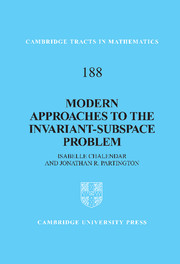Book contents
- Frontmatter
- Contents
- Preface
- 1 Background
- 2 The operator-valued Poisson kernel and its applications
- 3 Properties (An,m) and factorization of integrable functions
- 4 Polynomially bounded operators with rich spectrum
- 5 Beurling algebras
- 6 Applications of a fixed-point theorem
- 7 Minimal vectors
- 8 Universal operators
- 9 Moment sequences and binomial sums
- 10 Positive and strictly-singular operators
- References
- Index
6 - Applications of a fixed-point theorem
Published online by Cambridge University Press: 07 October 2011
- Frontmatter
- Contents
- Preface
- 1 Background
- 2 The operator-valued Poisson kernel and its applications
- 3 Properties (An,m) and factorization of integrable functions
- 4 Polynomially bounded operators with rich spectrum
- 5 Beurling algebras
- 6 Applications of a fixed-point theorem
- 7 Minimal vectors
- 8 Universal operators
- 9 Moment sequences and binomial sums
- 10 Positive and strictly-singular operators
- References
- Index
Summary
One of the oldest results on invariant subspaces is the theorem of Aronszajn and Smith [18], published in 1954, that every compact operator has a nontrivial invariant subspace. Note that, since every non-zero point of the spectrum of a compact operator is an eigenvalue, this result gives new information only in the quasinilpotent case. In fact, the somewhat simpler result for a compact operator on a Hilbert space had been given earlier in unpublished work of von Neumann. The method used to prove the Aronszajn–Smith result was based on the idea of a metric projection onto a finite-dimensional subspace of a Banach space, that is, the construction of a closest point in the subspace.
A much stronger result, given in 1973 by Lomonosov [145], concerns hyperinvariant subspaces for operators that commute with compact operators, and we shall begin by presenting this. The method of proof involves the use of the Schauder–Tychonoff fixed-point theorem,and this will be a unifying theme for this chapter, since we shall then present more recent generalizations due to Simonič [185], which also apply this fixed-point theorem, and which are concerned with essentially self-adjoint operators (that is, operators T for which T - T* is compact). These results constitute a significant advance on the Lomonosov result, although at present they mainly apply to real normed spaces.
Operators commuting with compact operators
An alternative proof of the existence of hyperinvariant subspaces for compact operators, using minimal vectors, is given as Corollary 7.4.5.
- Type
- Chapter
- Information
- Modern Approaches to the Invariant-Subspace Problem , pp. 169 - 182Publisher: Cambridge University PressPrint publication year: 2011

